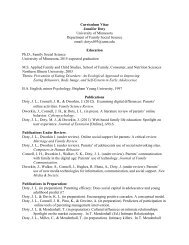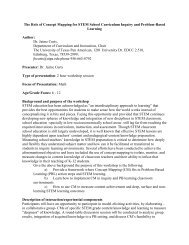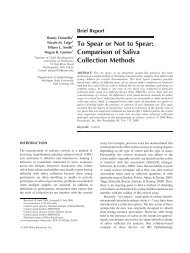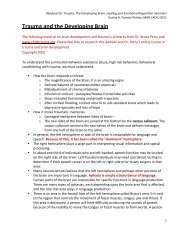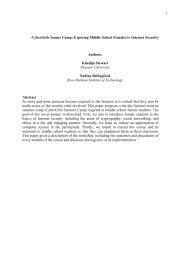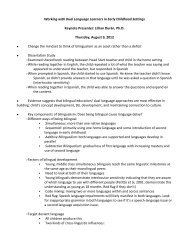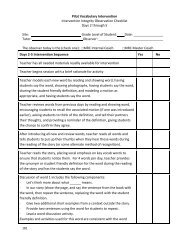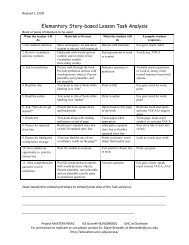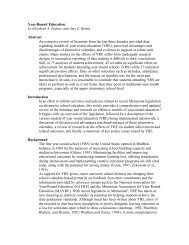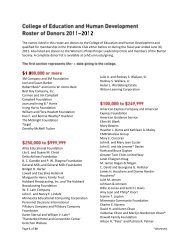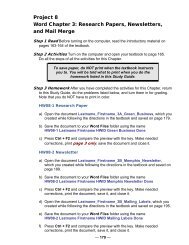Introduction to Positive Ways of Intervening with Challenging Behavior
Introduction to Positive Ways of Intervening with Challenging Behavior
Introduction to Positive Ways of Intervening with Challenging Behavior
You also want an ePaper? Increase the reach of your titles
YUMPU automatically turns print PDFs into web optimized ePapers that Google loves.
* Natural and/or logical.<br />
* Related <strong>to</strong> the rule.<br />
Consequences should also:<br />
* Preserve the student's dignity.<br />
* Increase student motivation.<br />
Four generic consequences which work for any rule are: reminders, warnings, practice following the rule, and a<br />
written plan. Contingency contracts, conferences, or meetings and practice sessions are examples <strong>of</strong> non-punitive<br />
consequences (see "Contingency Contracts," "Shaping," and "Self-Moni<strong>to</strong>ring").<br />
Threats are effective only in creating combative environments. Furthermore, many traditional consequences<br />
result only in making the student dislike school or aspects <strong>of</strong> it. Writing "I will not throw paper" 100 times only<br />
makes the student's hand sore, makes him or her hate writing, is an illogical consequence, and teaches nothing.<br />
How do I draw up a social contract?<br />
Foremost, the contract should be drawn up <strong>with</strong> the students. Student involvement makes the contract more<br />
immediate and it is ultimately more likely that students will follow a plan which they help draw up.<br />
Students can develop rules for each other, making sure that they are not <strong>to</strong>o vague or specific, as stated<br />
previously. They can be involved in developing consequences as well. However, do not accept any rules or<br />
consequences which you would not feel comfortable enforcing.<br />
Students can be allowed <strong>to</strong> vote on negotiable rules. Do not put rules which you deem absolutely necessary<br />
up <strong>to</strong> a vote. It is advisable that a vast majority (75%) <strong>of</strong> the students pass the rule.<br />
Furthermore, students can include rules for the teacher. While you should not accept a rule you cannot live<br />
<strong>with</strong>, such rules can be quite useful. If you are caught breaking a rule, the opportunity is provided <strong>to</strong> model an<br />
appropriate response. Examples <strong>of</strong> rules imposed on teachers are:<br />
* If students cannot eat in class, the teacher cannot drink c<strong>of</strong>fee during class.<br />
* Do not call a student's home <strong>with</strong>out first telling him or her <strong>of</strong> your intent.<br />
* Tests will be corrected and handed back <strong>with</strong>in three days.<br />
What if a student pleads ignorance <strong>to</strong> a rule or principle in the contract?<br />
You can prevent this from happening by requiring each student <strong>to</strong> take a test on the social contract. This can<br />
include short answer, true and false, and/or multiple choice questions concerning acceptable behavior for the<br />
classroom and permitted consequences for unallowable behavior. Students must score 100%, although nothing<br />
happens if they do not pass. Go over their incorrect answers <strong>with</strong> them and have them repeat the test.<br />
How long should I plan on devoting <strong>to</strong> the formulation <strong>of</strong> a social contract?<br />
The greater portion <strong>of</strong> two or three class period leaves plenty <strong>of</strong> time for discussion, dissent and reaching<br />
consensus and gives students time <strong>to</strong> think about what they want rather than pressuring them <strong>to</strong> sign on directly<br />
after being introduced <strong>to</strong> the idea.<br />
A contract should be drawn up by each class in which you intend <strong>to</strong> use one. Even if there are only two<br />
different students in second period, do not use the same contract from first period. Every student should be<br />
included in the process.



